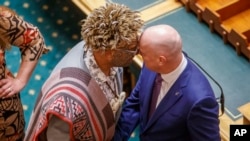Thousands of demonstrators in New Zealand are protesting the new government's policies towards indigenous Māori communities.
The new center-right coalition government in Wellington plans to limit the use of Māori language, review affirmative action policies and reassess how the country's founding document - the Treaty of Waitangi of 1840 - is interpreted in modern legislation.
The treaty was a 19th-century agreement between the British monarchy and about 540 Māori rangatira, or chiefs.
It pledged the protection of Māori land and established British law in New Zealand.
The government wants to wind back policies that acknowledge Māori as New Zealand’s first people and atone for the wrongs of European colonization.
There are also plans to scrap a dedicated indigenous health authority. Māori represent about 16.5% of the national population of around 5 million.
They suffer high rates of poverty, and more than 50% of prison inmates are Māori, according to official figures.
The government has promised to treat New Zealanders equally, regardless of race.
However, the protesters believe the new government has a “racist” agenda that’s an “assault” on indigenous rights.
Rally organizer Tuku Morgan told New Zealand television that there is intense anger in the Māori community.
“This is to send a clear message to the government that we will not tolerate their racist policies, that we re deeply concerned and outraged in terms of the legislative program rolling back all of the achievements,” Morgan said.
Demonstrators also told local media that the planned policy changes are insulting.
“I guess it is scary for most of us Māori,” one man said.
Prime Minister Christopher Luxon leads a center-right coalition government with the libertarian ACT New Zealand party and the populist New Zealand First.
Luxon said Wednesday’s demonstrations were "unfair" for a government that's only been in office for a week. He indicated to local media that his administration should be given more time to deliver better outcomes for the Māori community.
David Seymour, the leader of ACT New Zealand, a junior coalition partner, told New Zealand media that the demonstrations were “divisive theatrics” that disrespected the outcome of a general election in October.
The rallies organized by Māori politicians have coincided with the official swearing in of Parliament in the capital, Wellington.
Demonstrators say more anti-government rallies are planned in the weeks and months ahead.





